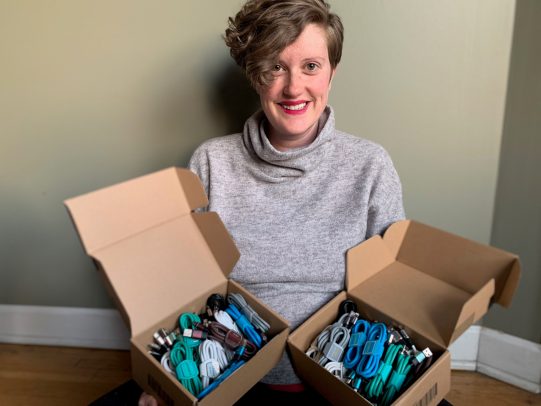Nursing clinical instructor starts fundraising campaign to donate cell phone chargers to hospital patients

By Deborah Ziff Soriano
It was after seeing a news story on COVID-19 patients at University of Illinois Hospital that Megan Cairns Tress, MS ’18, FNP, had a “lightning bolt of inspiration.”
The story featured alumnus Daniel Ortiz, MS ’17, RN, sharing his experience working on the COVID ward, with the headline, ‘Patients are Terrified in Their Hospital Beds.’
“As soon as I saw that I was like, ‘holy smokes,’” said Tress, who is a family nurse practitioner at PCC Community Wellness and a clinical instructor at UIC Nursing. “[The patients] can’t have any visitors and they likely didn’t bring their cell phone chargers. No one remembers phone numbers anymore. If they can’t use their phones, they’ve lost that vital contact point.”
Tress started a fundraising campaign to raise money to buy cell phone chargers for area hospitals and quickly raised about $1,200. She found a wholesaler and was able to buy 700 chargers within three days, more than enough for every bed at University of Illinois Hospital and West Suburban Medical Center in Oak Park, where they have already been distributed.
“There was a lot of positive feedback,” she says, adding that people were saying: “‘Wow, what a small thing, but so practical.’”
Tress began partnering with Jon Hefler, a San Diego man who went on a similar mission after his father was hospitalized with COVID-19 and needed a phone charger. The two are now taking their initiative nationwide. Together, they’ve raised more than $33,000 and shipped chargers to more than five states. With the initiative growing rapidly — her story has been featured on WTTW — Tress has created a small team to work on contacting hospitals and distribution, including BSN student Ana Maria Malicdem.
‘I saved a life’
Tress was doing this while also working a COVID-19 hotline at PCC Wellness Center, which takes calls from all comers, regardless of whether they are PCC patients or insured.
“The biggest goal of the hotline is to keep people out of the hospital,” she said, adding that she’s taken some 500 calls and kept nearly all of them out of the emergency room by talking them through symptom management.
Still, when someone exhibits critical symptoms, such as not being able to breathe, she encourages them to go to the hospital, which is what happened with one patient who concerned Tress so much that she doggedly followed up with her for four days after their initial conversation.
When they finally connected, Tress said the patient was delirious and didn’t even know her own address. Tress told the patient’s partner to take her to the hospital and called ahead to have her admitted to the ICU.
When she finally heard back from the patient’s partner (coincidentally, Tress suspects their cell phones died in the hospital), he told her, “‘We’re OK, but we might not have been if you hadn’t called back.’”
“I was bawling,” she said. “It was the first time I really felt like I saved a life. And it was through that hotline.”
Donations can be made to a GoFundMe account.
Categories
